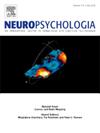一致性对阿尔茨海默病和语义性痴呆患者视觉探索和情景记忆表现的影响
IF 2
3区 心理学
Q3 BEHAVIORAL SCIENCES
引用次数: 0
摘要
越来越多的证据表明,语义知识在调节我们如何感知和随后记忆经验方面所起的作用。在健康老龄化中,先验知识在情景编码和检索过程中对视觉探索的指导作用越来越重要,当与待学习信息不一致时,先验知识可能会阻碍表现。然而,目前尚不清楚在神经退行性疾病中视觉信息和先验知识的动态整合是如何改变的,以及这是否会影响动眼肌行为。在这里,我们探讨了语义性痴呆(SD)中概念知识库的退化如何影响新信息的获取和检索,以及这种变化如何与动眼肌行为相关。10例特征良好的SD病例与12例疾病匹配的阿尔茨海默病(AD)病例和24例健康老年人对照进行比较。参与者先完成一个视觉搜索任务,然后是一个惊喜记忆任务,在这个任务中,目标物体被显示在语义一致或语义不一致的位置。通过测量参与者在每种情况下探索目标一致区域所花费的时间来评估眼部运动表现。与对照组相比,AD组的视觉搜索和记忆表现明显受损,表现为反应时间变慢、任务准确性降低以及对目标一致区域进行更广泛的视觉探索。相比之下,当目标物体显示在语义不一致的位置时,SD患者在视觉搜索任务的所有行为和动眼力测量中得分与对照组一致。总的来说,我们的研究结果表明,痴呆患者的语义和情景记忆系统的退化对视觉探索和记忆检索的影响是不同的,这取决于刺激一致性。本文章由计算机程序翻译,如有差异,请以英文原文为准。
The effect of congruency on visual exploration and episodic memory performance in Alzheimer's disease and semantic dementia
Mounting evidence points to the role of semantic knowledge in modulating how we perceive, and subsequently remember, experiences. In healthy aging, prior knowledge becomes increasingly important to guide visual exploration during episodic encoding and retrieval and can hinder performance when incongruous with to-be-learned information. It remains unclear, however, how the dynamic integration of visual information and prior knowledge is altered in neurodegenerative disorders, and whether this impacts oculomotor behaviour. Here, we explored how degradation of the conceptual knowledge base in semantic dementia (SD) impacts the acquisition and retrieval of new information, and how such changes relate to oculomotor behaviour. Ten well-characterised cases of SD were compared to 12 disease-matched cases of Alzheimer's disease (AD) and 24 healthy older Controls. Participants completed a visual search task followed by a surprise memory task where target objects were displayed in either semantically congruent or semantically incongruent locations. Oculomotor performance was evaluated by measuring the time participants spent exploring target congruent areas in each condition. Relative to Controls, visual search and memory performance was significantly compromised in AD, as indexed by slower response times, reduced task accuracy, and more extensive visual exploration directed towards target congruent areas. In contrast, SD patients scored in line with Controls for all behavioural and oculomotor measures on the visual search task when target objects were displayed in semantically incongruent locations. Overall, our findings suggest that degradation of the semantic and episodic memory systems in dementia differentially impacts visual exploration and memory retrieval depending on stimulus congruency.
求助全文
通过发布文献求助,成功后即可免费获取论文全文。
去求助
来源期刊

Neuropsychologia
医学-行为科学
CiteScore
5.10
自引率
3.80%
发文量
228
审稿时长
4 months
期刊介绍:
Neuropsychologia is an international interdisciplinary journal devoted to experimental and theoretical contributions that advance understanding of human cognition and behavior from a neuroscience perspective. The journal will consider for publication studies that link brain function with cognitive processes, including attention and awareness, action and motor control, executive functions and cognitive control, memory, language, and emotion and social cognition.
 求助内容:
求助内容: 应助结果提醒方式:
应助结果提醒方式:


